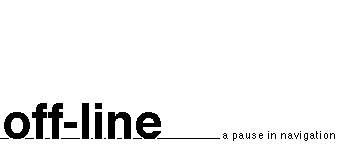 |
 |
(technologies come and go, humanity lasts) June , 1999 |
 |
 |
(technologies come and go, humanity lasts) June , 1999 |
| Giancarlo Livraghi gian@gandalf.it |
|
| |
||||
|
Experts say the TCP/IP protocol isn't perfect. I guess they are right. But it was a wonderful invention and it's been working nicely for twenty years. It started with four hosts, now it's handling over 43 million. Quite remarkable. But... if nobody had ever set up the internet, would we be online? I think the answer is yes.
Will the internet be tomorrow's technology? Probably. But not the only one. We are still at the beginning of turbulent evolution of telecommunications. The cost of long-distance connections is close to zero; prices will have to tumble; it will become more and more practical for organizations (large or not-so-large) to manage their own networks directly. Wireless communication is spreading so fast that it's likely to become the backbone. The traditional concept is being turned upside down: data transmission as the basic structure, voice and video as the optionals. The networking systems that we shall use three or ten years from now may be quite different from the internet as we know it. The only rule of the technogame is that everything keeps changing. We are surrounded by simple technologies that work quite well and we don't even realize that they are networks. Such as the little one-button punch machines that call taxis (and will become even more efficient with satellite localization). Telephones aren't being used very much, so far, as "online" tools. But there are technologies, already operational, that can change that – and go well beyond SMS. Some say that phones will replace computers as the access tool for the internet, and I think that's a bit silly (see Mobilemania.) But for a number of specific tasks phones and other tools can and will work well, with or without the internet. The fact is that technologies change all the time. Often they rush into what looks like a wide highway and turns out to be a dead alley. It's practically impossible to predict how they will evolve – and which, of countless possible applications, will really turn out to be useful, compatible and shared. But there is a clear continuity thread that won't break so easily and is not threatened by unexpected obsolescence. It's not about machines, software and protocols. It's about people. I think Kevin Kelly is right when he says that we're moving beyond the information era into the "network economy". If we think of network systems not as connecting chips, but as connecting people, we have a clear perception of something that is quite new for the opportunities it offers today but is deeply routed in the DNA of our species. The tools can (and will) change; but human nature won't change in a year, a decade or a century. I've heard and read countless debates about the potential size of the "internet market" in Europe. Do you know how big it could really be? Three or four hundred million people. Because the extended potential of the market doesn't include only the people that are connected. It includes all the people that could reach us if they really tied; that is to say, if we had something really attractive and useful to offer. (I wrote about this a year ago – see Littletown, Metropolis... or a continent.) A friend of mine is the prototype technophobe. He doesn't drive a car, he's never touched a keyboard, he writes articles and books with a fountain pen. He buys from Amazon. How? He calls me (from a strictly "static" telephone) and says "Please, next time you order books..." And of course he has disciples and assistants who do research for him on the net. How many people are there today, in most of Europe, that don't know someone who knows how to get on the internet?
If we concentrate on content and human relationships we can build networks of great value, that (if well managed and nurtured) last and grow over time. And they have a wonderful quality: they survive any change of technology. This, I think, is the basic concept that should be the cornerstone of any online communication project. |
||||